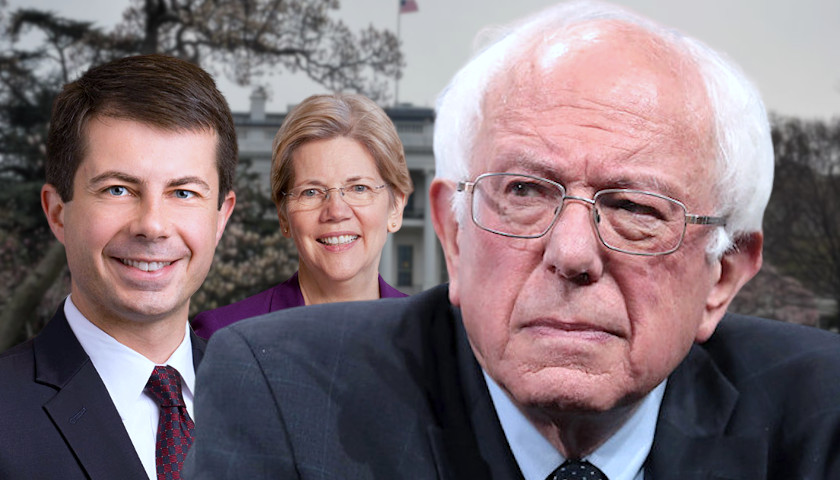by Jim Malone
WASHINGTON – The U.S. Democratic Party finds itself at a crossroads at a critical time in the 2020 election cycle.
Vermont Sen. Bernie Sanders, a self-described democratic socialist, is the clear front-runner for the party nomination, despite warnings from moderate Democrats that Sanders would lead the party to defeat in November against President Donald Trump.
As Democrats prepare for the busiest weeks of the primary season, they find their party once again sharply divided between its progressive wing and moderates, reminiscent of the 2016 nomination battle where Hillary Clinton eventually outlasted Sanders.
Shouting and fretting
The liberal-moderate split was on full display during the latest Democratic debate in Charleston, South Carolina, broadcast by CBS News.
Sanders came under attack but defended the core vision of his campaign that seeks to close the vast gap in the country between those who are doing well economically and those who are struggling.
“That is not an economy that’s working for the American people. That’s an economy working for the 1%,” Sanders said during the debate. “We’re going to create an economy for all, not just wealthy campaign contributors.”
But Sanders got plenty of pushback from moderates who fear his nomination would send the party to defeat in November, possibly dragging congressional Democrats down with him.
Former South Bend, Indiana, Mayor Pete Buttigieg was among those sounding the alarm.
“If you think the last four years has been chaotic, divisive, toxic, exhausting, imagine spending the better part of 2020 with Bernie Sanders versus Donald Trump. Think about what that will be like for this country,” Buttigieg said.
Energized base
Sanders and his supporters argue he is succeeding because the Democratic Party has moved to the left since 2016. Sanders also points out that his victories in the early primaries and caucuses have demonstrated his appeal to younger, more energized voters, which he sees as the key to a big Democratic turnout in the November election.
More than the other Democratic contenders so far, Sanders has generated some excitement, says John Fortier of the Bipartisan Policy Center in Washington.
“I think he has some strength. He has a good core of people who are going to be with him no matter where he is, and he is likely to do very well, either winning or coming in second in the states ahead. So, he is in a pretty strong position,” Fortier said.
But as Sanders’ prospects to be the nominee rise, moderate Democrats like Jim Kessler of the center-left advocacy group Third Way grow more concerned.
“If you add up the moderate votes together in the early primaries, more people are voting for moderates,” Kessler told VOA. “For a moderate or a mainstream candidate to win that number, (the Democratic field) needs to consolidate, in terms of who is vying for those votes.”
Republicans watching
Moderates like Buttigieg, former Vice President Joe Biden, Minnesota Sen. Amy Klobuchar and former New York City Mayor Michael Bloomberg believe Trump and his Republican supporters would be thrilled if Sanders won the Democratic nomination. George Washington University expert Matthew Dallek said they have a point.
“They would be able to exploit Sanders and some of his past positions like Medicare for All. So, I think it is a much bigger target politically for the Republicans to have someone like a Bernie Sanders at the top of the ticket,” he said.
And with several moderates vying to be the establishment alternative to Sanders in a battle that could go on indefinitely, Fortier said Republicans want the Democratic divide to continue as long as possible.
“I do think that the president and his team are happy this week because there is disarray on the Democratic side,” Fortier told VOA in an interview. “And it is not clear who is going to be the candidate, and perhaps a candidate like Sanders, who would be pretty far left, would be the nominee.”
Writing in The Wall Street Journal Thursday, Karl Rove, a former political strategist for former President George W. Bush, warned Democrats that “time is short, and it may be that Mr. Sanders is unbeatable.” Rove added, “But make no mistake: With a socialist on a trajectory to be the Democratic nominee, Republicans couldn’t be happier.”
Key test to come
The Democratic field faces some key races in the coming days. South Carolina holds its primary Saturday, a key test for Biden.
Next week, on what is known as Super Tuesday, 14 states hold primaries, with a total of 1,357 pledged delegates at stake. Sanders is favored to do well in several of those states, especially California, which has 415 delegates up for grabs.
Analysts predict Sanders will continue to have an advantage in the primary race as long as the moderate contenders fail to rally around one candidate.
“All of them have certain advantages but certain minuses, as well,” said Darrell West of the Brookings Institution in Washington. “And I think for one of the moderates to defeat Sanders, the field is really going to have to coalesce around one of those individuals.”
The last two debates among the Democratic contenders have been hard-fought and even chaotic at times. Candidates shouted back and forth, while moderators struggled to keep order.
During the debate in Charleston, Klobuchar cautioned her rivals.
“If we spend the next four months tearing our party apart, we are going to watch Donald Trump spend the next four years tearing our country apart,” she said.
After Super Tuesday, the Democratic race heads to other large states with hundreds of delegates at stake, including Michigan and Missouri on March 10, and Arizona, Florida and Ohio on March 17.
– – –
Photo “Bernie Sanders” by Gage Skidmore. CC BY-SA 2.0.




